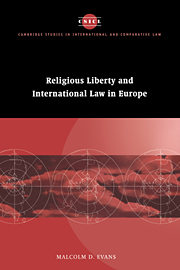Book contents
- Frontmatter
- Contents
- Acknowledgments
- Chronological table of international treaties
- Table of cases
- List of abbreviations
- Introduction
- 1 Early antecedents
- 2 From Augsburg to Paris
- 3 The League of Nations: drafting the Covenant
- 4 The Polish Minorities Treaty
- 5 The extension of the minorities system
- 6 The experience under the League
- 7 The UN system
- 8 Article 18 of the International Covenant on Civil and Political Rights
- 9 The 1981 Declaration on the Elimination of All Forms of Intolerance and of Discrimination Based on Religion or Belief
- 10 Religious freedom under the European Convention on Human Rights: the drafting of Article 9 and of Article 2 of the First Protocol
- 11 The application of Article 9 of the European Convention on Human Rights
- 12 Restrictions upon the scope of Article 9(1)
- 13 The application of Article 2 of the First Protocol
- 14 An interim conclusion
- Bibliography
- Index
- CAMBRIDGE STUDIES IN INTERNATIONAL AND COMPARATIVE LAW
12 - Restrictions upon the scope of Article 9(1)
Published online by Cambridge University Press: 06 January 2010
- Frontmatter
- Contents
- Acknowledgments
- Chronological table of international treaties
- Table of cases
- List of abbreviations
- Introduction
- 1 Early antecedents
- 2 From Augsburg to Paris
- 3 The League of Nations: drafting the Covenant
- 4 The Polish Minorities Treaty
- 5 The extension of the minorities system
- 6 The experience under the League
- 7 The UN system
- 8 Article 18 of the International Covenant on Civil and Political Rights
- 9 The 1981 Declaration on the Elimination of All Forms of Intolerance and of Discrimination Based on Religion or Belief
- 10 Religious freedom under the European Convention on Human Rights: the drafting of Article 9 and of Article 2 of the First Protocol
- 11 The application of Article 9 of the European Convention on Human Rights
- 12 Restrictions upon the scope of Article 9(1)
- 13 The application of Article 2 of the First Protocol
- 14 An interim conclusion
- Bibliography
- Index
- CAMBRIDGE STUDIES IN INTERNATIONAL AND COMPARATIVE LAW
Summary
The root of the problems discussed in the previous chapter lies in the individual having the right not only to hold a religion or belief but also to be able to act in accordance with them. This makes it necessary to distinguish thought and conscience from religion and belief. It also makes it necessary to distinguish between actions which are manifestations of such beliefs and those which are not. The Court and Commission have spun a web of tortuous, and often untenable, distinctions intended to differentiate between the interests at stake.
When the interests concerned are those of the individual and of the State, then the ‘public/private’ sphere distinction is of some help, as has been seen in the context of cases relating to participation in State-run schemes. This distinction is of little relevance when the right to manifest a belief in the public sphere is itself at issue and there comes a point beyond which it is futile to attempt to evade the central question. That point was reached in the Kokkinakis case, which concerned the clash of rights between the individual wishing to spread his belief and the right of another to be protected in the enjoyment of her own, and could not be avoided. This can only be resolved by having regard to the range of limitations which might be legitimately placed upon the enjoyment of the rights articulated in Article 9(1) and which will be examined in this chapter.
- Type
- Chapter
- Information
- Religious Liberty and International Law in Europe , pp. 315 - 341Publisher: Cambridge University PressPrint publication year: 1997

